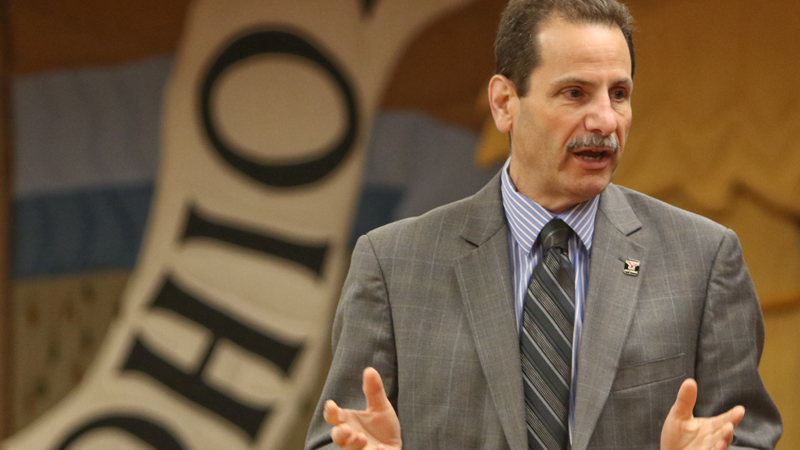Provost says finances can’t be motivation for hiring more YSU faculty

By AMANDA TONOLI
atonoli@vindy.com
YOUNGSTOWN
Finances can’t be a motivation for hiring more full-time faculty, Youngstown State University’s provost said.
Faculty attending Monday’s Brown Bag Lunch Series with University Provost Martin Abraham raised concerns about not having enough faculty to teach classes so that students can graduate on time.
“We have to be motivated to do the right things for our students from an academic and moral standpoint, not financial,” said Abraham, who is responsible for all academic operations. “It’s not about money. It can’t be. Finances motivate us to do the wrong things.”
Adding more full-time faculty or improving university procedures should not be based on finances, but on what’s best for the student, Abraham said.
“The truth of the matter is all of the things we want to do for the good of the student are bad for the university from a financial perspective,” Abraham explained, adding “a student who takes five years to graduate or six [will] continue to pay tuition, and for that time the university makes more money. From a financial standpoint, we are incentivized to do the wrong thing.
“We have to be motivated to do the right things for the right reasons and that means getting the right faculty into classes so that we can get [students] in the classes and get them graduated ideally in four years,” Abraham said.
Journalism director Mary Beth Earnheardt asked Abraham for guidance on the most effective way to make an argument for new faculty.
“What are you looking for?” she said. “It doesn’t seem to be like, ‘Hey there’s no one to teach these students, and we’ve got a lot of students and no one to teach them.’ So, what are the specific things that would make a successful argument?”
Abraham said it’s a matter of production.
“We look at the numbers of majors, we look at the numbers of classes that get taught, and the credit hour production — those sorts of things,” he explained. “We also look at strategic needs. Is this an area that we believe is going to continue growing? Is this an area that we want to be investing in? Then we take the list of 50 or 60 faculty lines we want to add and pare it down to 15 or 20 we can afford. That leaves us with a lot of faculty we’d like to add because we need them, but we just can’t afford them.”
The argument is not a question of how the department needs the faculty, but how the faculty will benefit the university in a substantial way, Abraham said.
“We [the university] are too reliant on part-time faculty,” he added. “This is not to say they don’t do a wonderful job, but we are too reliant on part-timers and we are insufficient in full-time faculty.”
And hiring more faculty might not be the only solution to getting students to graduate in four years, Abraham said. He suggested more cuts in classes and credit hours needed to graduate.
“We can streamline the curriculum and get some of that bloat out and help students be more successful,” he explained. “Maybe we do that at the expense of some other courses which we like to teach, but maybe are not a critically important course ... So we end up with programs we are offering with all this content we all think is critically important to the success of a student, but I know, and you know, they would probably be just fine without.”
Abraham said the goal would be not to make the content or the courses easier, but make the programs easier for students to succeed in.
“For every student, 90 percent of what we teach they won’t use,” Abraham said.
 43
43
